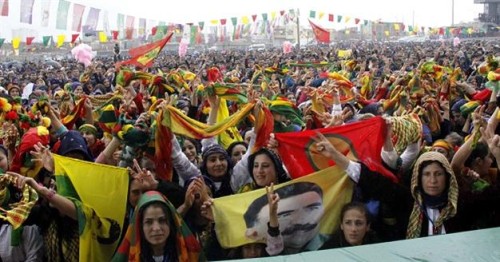PHOTO: Kurds rally in Diyarkabir in southeastern Turkey on Saturday (DHA)
Abdullah Öcalan, the imprisoned leader of the outlawed Kurdistan Workers’ Party (PKK), has called on the group to convene an extraordinary congress to “end the 40-year-long armed struggle”.
A two-page letter from Öcalan was read, in Kurdish and in Turkish, during New Year festivities in Diyarbakir Province on Saturday:
I find it necessary for the PKK to convene a congress to end the 40-year-long armed struggle against TC [Republic of Turkey] and to determine political and social strategies and tactics in accordance with the spirit of new era.
Hundreds of thousands convened in Diyarbakir’s Nevruz Square, despite rain and cold, to listen to the statement.
Öcalan, who has been detained since 1999 and was initially sentenced to death, stressed the need for a “democratic solution” to Turkey’s Kurdish problem. He said that “meaningless and merciless identity wars” were the result of “the neoliberal crisis caused by the imperialist capitalism and its local collaborators.”
The leader hailed a new era for Kurds “based on free, egalitarian, constitutional citizenship within the Republic of Turkey”.
During New Year’s festivities in 2013, Öcalan called on the PKK to declare a ceasefire and begin a political struggle for the rights of Kurds. The statement came months after negotiations began with the Turkish Government.
In February, the Peoples’ Democracy Party (HDP) announced Öcalan’s request for the PKK to hold a spring congress to discuss disarmament. In return, Ocalan announced a list of priorities — restated today — including the definition and content of democratic politics; legal guarantee of free citizenship; a process to deal with social and economic issues; addressing of issues concerning women, culture, and the environment; and a new constitution.
Government Bust-Up Over Kurdish Peace Process
Meanwhile, the Government has criticized President Recep Tayyip Erdoğan for trying to undermine the peace process with the Kurds.
Erdoğan said on Saturday that he did not approve the formation of a monitoring committee, even though the Government and the People’s Democracy Party — representing the Kurds — had agreed on the step.
Deputy Prime Minister Bülent Arınç hit back on Saturday, “[Erdoğan’s] statements that ‘I didn’t like it’ or ‘I don’t approve this and that’ are his emotional remarks. The responsibility belongs to the government and we can regard his statements as his personal views.”
Arınç continued:
Our government regards this step an appropriate one. We also have a road map on who’s going to do what throughout the process. It’s the government that is running the country and the responsibility belongs to the government.
It’s impossible to think that our President is unaware of the developments and of our steps. He knows everything very well. These issues are in-detail discussed at the National Security Council meetings as well as weekly meetings with our Prime Minister.

